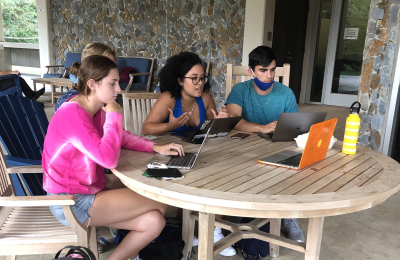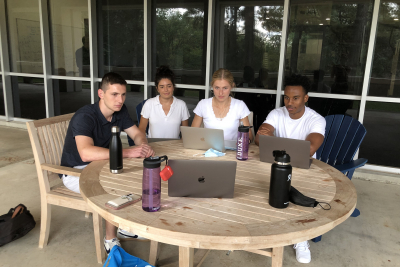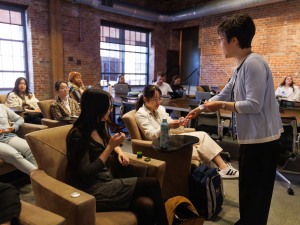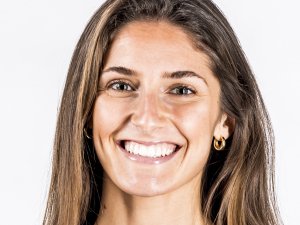What MMS Students Learned While Helping Businesses in Rural Panama

What if the words you use every day in your business with clients do not translate perfectly into other languages?
This is one of the international business consulting challenges that Martha Reeves’ capstone course experienced this past semester as they worked with Global Brigades Panama. They held remote meetings with clients in rural locations and communicated solely through translators as they gained valuable lessons and experiences they will take with them into their future careers.
A health and development nonprofit, Global Brigades allows students from participating universities to work collaboratively with community partners to help entrepreneurs grow their businesses to become more economically self-sufficient.
In Fall 2021, six teams of undergraduates in MMS 450 were paired with a local entrepreneur and a translator to develop business plans and strategies. Students also had a mentor from major consulting firms in the US who helped them refine their ideas and deliver the best plans to their Panamanian clients. Through this project, they not only received practical consulting experience, but very specific practice within a different culture and setting.
For MMS senior and History major Hannah Thurston, the challenge deepened a lesson she first learned when she moved from her native UK to study in the United States.
“I thought we speak the same language, so the cultures must be the same,” Hannah said. “But it’s really different, and it’s even more different when you’re talking to someone from a rural place in Panama that doesn’t have the access to all the things that we have here.”
Hannah worked with a team on one of Global Brigades’ flagship ventures, a community banking system that provides accessible banking options for under-resourced communities. With little previous knowledge of Panama before the project, Hannah learned to check her assumptions and focus on navigating cultural differences.
Her team’s client, a woman who is currently running the small bank, had no previous finance or bookkeeping background before MMS students came aboard to help in her pursuit to double the bank’s membership. In order to best advise their client, Hannah and the team first began by immersing themselves in understanding the role and necessity of a community bank.
“I think in the West we are so used to just being able to get money out on a debit card, and in these rural communities they don’t have access to that,” Hannah said. The community bank thus works to create a culture of saving and provides loans for small businesses — the kinds of small businesses other students in the class were supporting.
Senior Public Policy and MMS student Simon Brown joined a team helping one of those businesses.
In the beginning, it was supposed to be a butcher shop. But the direction completely changed shortly after the students began working, and the client decided to start a bakery instead.
“You have to be extremely flexible,” Simon said, noting that the team was nonetheless excited to take part and the changes only kept them on their toes.
While many of the groups were working in a consulting-style relationship with established small businesses, Simon and his team were working from scratch. They were able to draw on their previous experiences and coursework to help their client on everything from defining her business goals to setting up promotional materials and logging sales.
In these assignments, another challenge students considered were the rural needs of their clients and the different types of technologies that would serve them best.
Many of the students learned that marketing campaigns through WhatsApp would become the go-to method for their clients. While this method might be a little different than standard advice for American businesses, the teams learned to incorporate the technologies their clients had access to in order to maximize success.
“We asked her right from the start if she had a computer or strong internet, and all she had was her smartphone,” Simon explained. “So that was all we could work with.”
By the time the semester was over, students like Hannah and Simon weren’t just well versed in the individual businesses that they worked with. They also had a better grasp of a completely different cultural environment as well, which allowed them to hone the kind of interpersonal skills required to be a consultant.
For students in the MMS Certificate program, the capstone serves as a final course to round-out four years of business education, allowing them to combine the lessons they learned from their varied coursework into one project that will set them on track for their next ventures. It also allows them to cooperate with and learn from others with different majors and interests.
In this course, though, students were able to do more than merely learn these valuable skills for themselves. They were able to pass those skills on to others, providing business consulting to real clients with tangible needs and projects.
“I really can’t say enough great things about this course.” Simon said. “You’re having a real-world experience where you actually could have the possibility and potential of making an impact on a person’s life. That’s something I didn’t go into the class thinking I’d come out with, but towards the end, I realized if we do make some inroads and deliver quality work to this person, we could have the potential to really help their business and help them provide for their family and improve whatever quality of life they’re trying to reach.”






